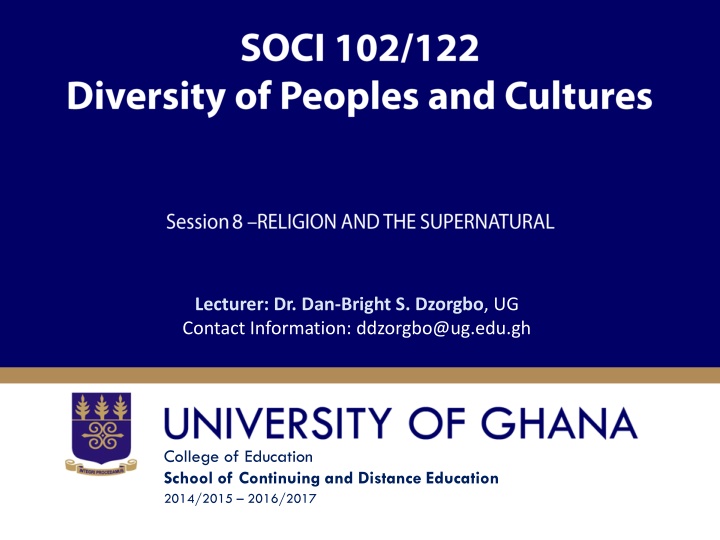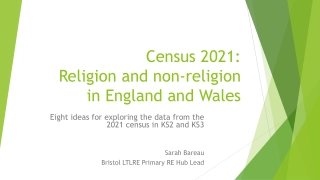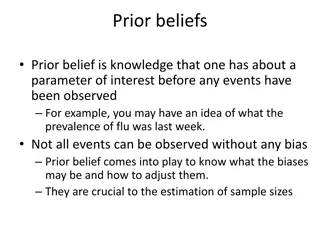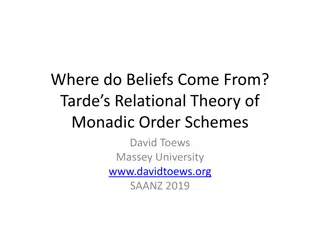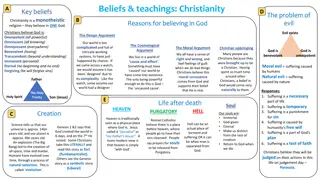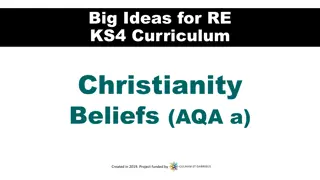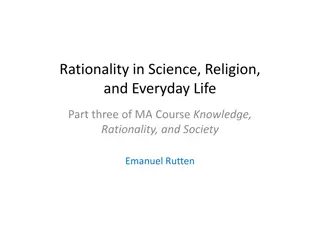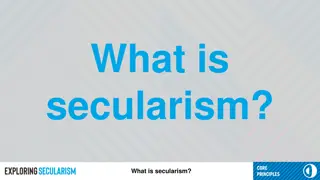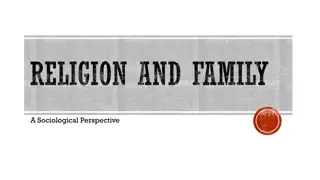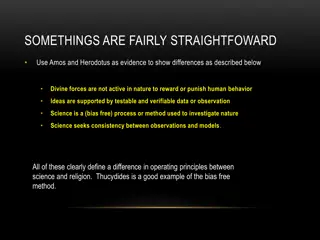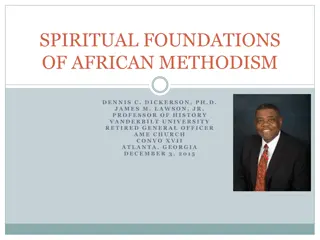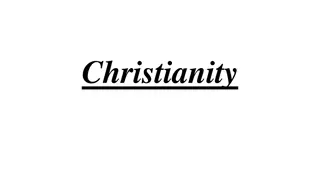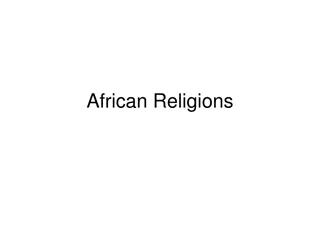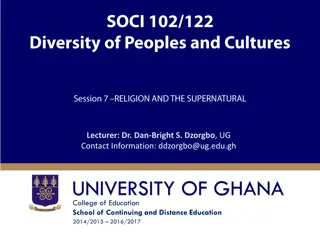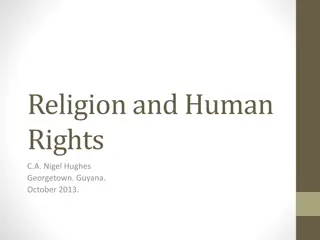African Traditional Religion and its Beliefs: An Overview
Understanding African traditional religion involves exploring the concept of the Supreme God, ancestor worship, witchcraft, magic, sorcery, and divination. This session delves into the relationship between religion, social rituals, and festivals, illustrating how it contributes to social solidarity. The reading list provided offers further insights into the sociological aspects of African traditional beliefs.
Download Presentation

Please find below an Image/Link to download the presentation.
The content on the website is provided AS IS for your information and personal use only. It may not be sold, licensed, or shared on other websites without obtaining consent from the author.If you encounter any issues during the download, it is possible that the publisher has removed the file from their server.
You are allowed to download the files provided on this website for personal or commercial use, subject to the condition that they are used lawfully. All files are the property of their respective owners.
The content on the website is provided AS IS for your information and personal use only. It may not be sold, licensed, or shared on other websites without obtaining consent from the author.
E N D
Presentation Transcript
Lecturer: Dr. Dan-Bright S. Dzorgbo, UG Contact Information: ddzorgbo@ug.edu.gh College of Education School of Continuing and Distance Education 2014/2015 2016/2017
Session Overview Introduction In the previous session we noted that religion is not just an institution that serves individual needs but it also serves society as a social control mechanism, etc. In this session, we explore African traditional Religion, and the relationship between witchcraft, magic, sorcery, divination. We also explore the relation between religion and social rituals such as festivals to illustrate the how religion contributes to social solidarity. Objectives At the end of the session, the student will be able to: Traditional African Region or Ancestor Veneration Distinguish what is witchcraft, magic and sorcery and Examine beliefs in lesser gods and divination Religion, Festivals and Social Solidarity Slide 2 Dr. Dan-Bright S. Dzorgbo, Sociology Dept. UG
Session Outline The key topics to be covered in this session are as follows: Topic One : Traditional African Religion and Ancestor Worship Topic Two: Nature of Smaller Gods Topic Three: Witchcraft, magic, sorcery and divination Topic Four : Religion, Rituals, Festival and Social Solidarity Slide 3 Dr. Dan-Bright S. Dzorgbo, Sociology Dept. UG
Reading List Assimeng, M. (1999), Social Structure of Ghana, Tema, Ghana Publishing Corporation. Kottak, C. P. (2004), Cultural Anthropology, Boston, McGraw Hill Corporation. Kottak, C. P. (2004), Anthropology: The Exploration of Human Diversity, Boston, McGraw Hill Corporation. Nolan, P. & G. Lenski, (2004 or any of the newer editions), Human Societies: An introduction to macrosociology, Boulder Paradigm Publishers. Nukunya, G. K. (2006), Tradition and change in Ghana: An introduction to sociology, Accra, Ghana University Press. Sanderson, S. K. & A. S. Alderson (2005 or its newer editions), World societies: the evolution of human life, Boston, Pearson Education Inc. Crapo R. H. (2002 or newer editions) Cultural Anthropology: Understanding Ourselves & Other, Boston, McGraw Hill. Slide 4 Dr. Dan-Bright S. Dzorgbo, Sociology Dept. UG
Topic One:Traditional African Religion and Ancestor Worship There is the concept of High or Supreme God in Traditional African Religion long before the advent of Christianity and Islam. The Supreme Being is believed to have created the universe and all the things therein and also has the greatest power. Names of the Supreme Being in local languages (give examples) and note that they all allude to the fact that God is the supreme one Although the Supreme God is socially and culturally acknowledged he is not the object of any organized worship with priesthood, temples, shrines or congregations The Supreme God can be worshiped though the ancestors hence the phenomenon of ancestor veneration Slide 5 Dr. Dan-Bright S. Dzorgbo, Sociology Dept. UG
Topic One:Traditional African Religion and Ancestor Worship (cont d) It is the belief of many Africans that God was with humans on earth but later departed to the sky because of the disturbances and noises on earth caused mainly by women. But God has representatives on earth which are the smaller gods which may be specialized gods e.g. gods of war, gods of fertility, earthly gods, river gods, etc . These gods are sometimes referred to as nature gods. These gods have their priests and can be called upon in time of need Thus beside the Supreme God, there are smaller gods Slide 6 Dr. Dan-Bright S. Dzorgbo, Sociology Dept. UG
Nature of Smaller Gods The smaller gods operate within shrines managed by priests and priestesses with their followers or believers. As already indicated they are also called the nature gods because they are believed to live in nature objects like rivers, ponds, forests, rocks and the sea. It is not these objects per se which people worship but rather the spirits that are believed to reside in them. Nature gods are believed not to have the ultimate powers but are depended on and controlled by the Supreme God who is the source of their powers. Slide 7 Dr. Dan-Bright S. Dzorgbo, Sociology Dept. UG
Topic Three: Witchcraft, Magic , Sorcery and Divination Witchcraft is the belief that some supernatural powers exist that people can use for certain purposes, usually to hurt others. Witchcraft like the ancestral spirits is feared but one important difference between the two supernatural forces is that the ancestral spirits are honoured and respected whereas witchcraft is not. Witchcraft is believed to be mostly used to cause damage hence the fear and disrespect associated with it. Witches are persons, male or female, who are believed to possess inherent supernatural powers which they use (knowingly or otherwise) to harm others or to benefit themselves. However, most witches are said to be women. Explanations of Witchcraft: Witchcraft accusation derive from hatred, jealousy, suspicion, envy, mistrust, misunderstanding and fear all deriving from social relationships Witchcraft is social levelling mechanism Magicians and sorcerers seem to do the same thing. The difference, however, is that magic refers to good magic and sorcery refers to bad magic . In effect sorcery is usually reserved for the anti- social use of magic. Sorcery is therefore the manipulation of physical objects to effect evil supernatural end. Throughout West Africa, sorcery is popularly known as juju. Slide 8 Dr. Dan-Bright S. Dzorgbo, Sociology Dept. UG
Topic Three: Witchcraft, magic , orcery and divination (cont d) Magicians and sorcerers offer consultancy services openly to those who need them. Those who have job interviews to attend go to them for assistance. Football teams consult magicians to ensure favourable outcomes from football games. People who need promotions at their workplaces, success in politics, office, and those who want to revenge or avenge a bad treatment also consult them. Others also consult them for protection against accidents and spiritual attacks. Magic exists in cultures with diverse religious beliefs. It can be seen in cultures that practice animism, ancestor worship, polytheism, monotheism and some Ghanaians sometimes consult magicians, in spite of condemnations of traditional religious practices. Divination is the manipulation of certain special objects with the hope that the future can be told or the unknown can be discovered. Divination ranges between very simple systems and extremely complex systems. When people want to inquire into the causes of their misfortunes or illnesses, look for lost property, know what the future holds for them or how they can be successful they resort to divination. The methods of divination may include examining the entrails of animals for unusual signs, reading the movement or flight direction of ants or birds, reading images from water, reading or interpreting lines on people s hands, reading astrological signs or spreading cards, beads, cowries and killing animals and determining the final position they take when they die, etc. Slide 9 Dr. Dan-Bright S. Dzorgbo, Sociology Dept. UG
Topic Four:Religion, Festival and Social Solidarity Social or collective rituals also known as festivals are ways through which diverse cultures manifest their beliefs associated with religion and the supernatural. Festivals are usually associated with ritual practices, drumming, dancing and eating. Underlying all these activities are some elements of religion. In many parts of Africa, festivals reveal the belief that there is a relationship between the living and their ancestors, the Supreme Being and lesser gods. Festivals may be performed by a group to remember some special social event in their history. E.g. in Ghana the Ga observes Homowo to remember the period when they were experienced a severe hunger and their gods and ancestors intervened by giving them a bumper harvest. Others examples of festivals in Ghana are Ohum for the Akyem, and Yam for the people of Peki in the Volta Region. Slide 10 Dr. Dan-Bright S. Dzorgbo, Sociology Dept. UG
Topic Four:Religion, Festival and Social Solidarity (contd) In Ghana, there are other festivals celebrated to remember certain events, like an epidemic, that occurred in the ethnic group s history. The epidemic might have killed a lot of them at the time. Examples of such festivals are the Asafotufiam festival of the people of Ada and Dayibakaka festival of the people of Anlo. Among the Ga, Akan and Anlo-Ewe there is a belief about twins. The Anlo-Ewe believes that failure to perform this ritual for the twins can mean disaster to the parents and also the twins. Rituals are performed to make the twins identify themselves fully with human life. By so doing the twins are believed to have been separated from the supernatural forces. This ritual is called alototro and is solely for the twins whilst there is another one called ewewowo for the parents of the twins. The ewewowo is meant to restore the parents to normalcy since it is believed that they went through an unusual experience from pregnancy to delivery of the twins. The above functions are manifest. When people engage in such festivals or social rituals the re- affirm themselves as one group with similar values and identity hence region and festivals as well as social and national rituals are occasion f For social integration and solidarity Slide 11 Dr. Dan-Bright S. Dzorgbo, Sociology Dept. UG
Conclusion In this session, we have examined: The nature of African Traditional Religion, The relationship between witchcraft, magic, sorcery, divination and We noted that they are all aspects of the supernatural and have religious dimensions and The rituals associated with religion and festivals are mechanisms through which society creates solidarity or social cohesiveness among its members. Slide 12 Dr. Dan-Bright S. Dzorgbo, Sociology Dept. UG
